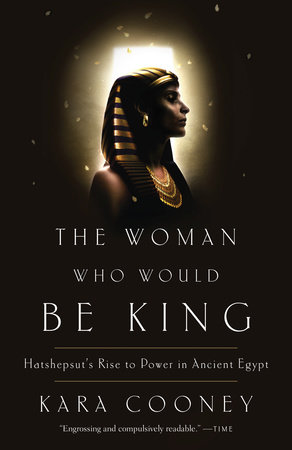
Kings' Daughter. King's Great Wife. God's Wife to Amen. King. Pharaoh. Hatshepsut. They are all the same woman, one who played many roles in her short life and accomplished what no other woman in the ancient world did. Hatshepsut was born into the Egyptian royal family with the destiny of being married to her own brother to secure the royal bloodlines, but she managed to keep the throne after her brother's death and rule for over two decades. The author has written a detailed and informative description of what Hatshepsut's life would have been like, the responsibilities she carried, and the powers she wielded. Where it is necessary to fill gaps in our knowledge with hypothesis, Cooney explains her reasoning and also offers theories suggested by others. There is an extensive section of notes explaining where her information comes from and why she has chosen to interpret things in the way that she has.
I've always been interested in ancient civilizations; I even majored in Latin and Classical Studies during my undergraduate days. This is a book I would have been glad to find on a class reading list because it develops a comprehensive picture of what Egypt was like during Hatshepsut's lifetime. Everything from poor teeth due to all the sand in the food to the practice of shaving children's heads to cut down on lice is included in the descriptions of palace life. The key figures surrounding this female king are described and their importance to the king explained, as well as how they benefited from the relationship. And the actions of her nephew and co-ruler, Thutmose III after her death are also examined.
The book is fascinating and packed with insights into the ancient world. Despite the names that are so unwieldy to modern tongues, it is a compelling read that carries you along from one obstacle that is overcome to the next. And there are so many facets of life in those times that are included - the palace and royal family; the temples and priesthood; festivals; the construction of buildings, obelisks, and tombs; and even the types of foods that were eaten or the embalming process all play a part in the saga.
I highly recommend this title to anyone who is interested in Egyptology, or ancient civilizations in general, and for those who enjoy reading about powerful female leaders.
I've always been interested in ancient civilizations; I even majored in Latin and Classical Studies during my undergraduate days. This is a book I would have been glad to find on a class reading list because it develops a comprehensive picture of what Egypt was like during Hatshepsut's lifetime. Everything from poor teeth due to all the sand in the food to the practice of shaving children's heads to cut down on lice is included in the descriptions of palace life. The key figures surrounding this female king are described and their importance to the king explained, as well as how they benefited from the relationship. And the actions of her nephew and co-ruler, Thutmose III after her death are also examined.
The book is fascinating and packed with insights into the ancient world. Despite the names that are so unwieldy to modern tongues, it is a compelling read that carries you along from one obstacle that is overcome to the next. And there are so many facets of life in those times that are included - the palace and royal family; the temples and priesthood; festivals; the construction of buildings, obelisks, and tombs; and even the types of foods that were eaten or the embalming process all play a part in the saga.
I highly recommend this title to anyone who is interested in Egyptology, or ancient civilizations in general, and for those who enjoy reading about powerful female leaders.
For more information about Kara Cooney, visit her author bio on the Penguin Random House site, where they also have more info about the book.
No comments:
Post a Comment